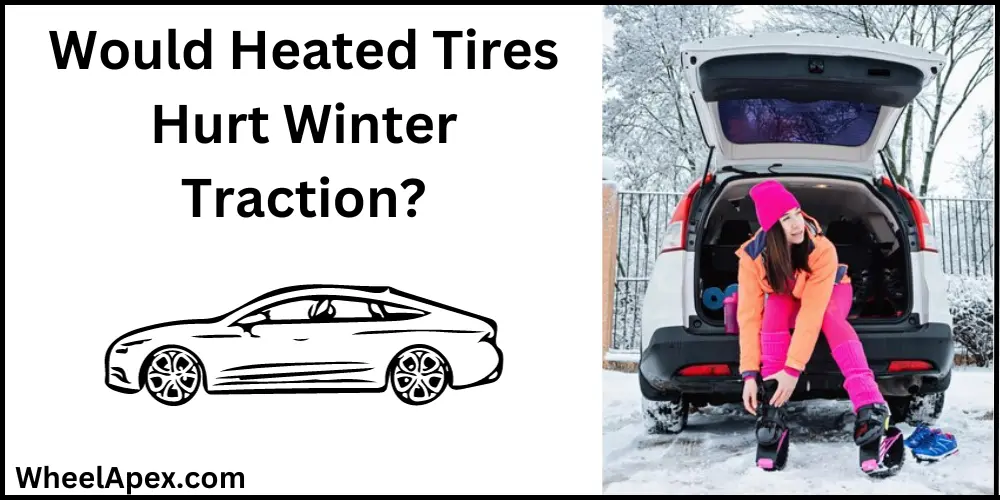As winter approaches, drivers across the world prepare to navigate treacherous road conditions. Particularly in regions with heavy snowfall and icy roads. To combat these challenges, heated tires have emerged as a novel solution. But do heated tires hurt winter traction, or would heated tires hurt winter traction? In this article, we will delve into the science behind heated tires and their potential impact on winter traction.
Contents
Would Heated Tires Hurt Winter Traction?
Would heated tires hurt winter traction? Heated tires are a new technology designed to combat the issues that arise when driving on snow and ice. Traditional tires can lose traction and become rigid in cold weather, increasing the risk of accidents. Heated tires aim to counter this problem by using integrated heating elements. To maintain a higher tire temperature, ensure that the rubber remains pliable and maintains optimal grip.

The Science Behind Heated Tires
The essential aim of warmed tires is to forestall the development of ice and snow on the tire’s surface. In this way further developing footing. At the point when the temperature decreases beneath freezing. The contact between an ordinary tire and the street surface. That can make dampness freeze, diminishing the tire’s hold. This is where warmed tires become an integral factor. They keep temperatures above freezing, keeping ice and snow from sticking to the tire. This, thus, assists with upgrading footing in winter conditions.
Additionally, the increased flexibility of the rubber in heated tires. Allows for better conformity to the road surface, creating a larger contact area. A larger contact area means better traction, as more of the tire’s surface can grip the road. Leading to improved stability and control.
Do Heated Tires Hurt Winter Traction?
Heated tires, when used as intended, should not hurt winter traction. They are designed to enhance traction in cold and snowy conditions. By forestalling ice and snow development, keeping a higher tire temperature. Further developing adaptability, warmed tires can be changed without a jack a unique advantage for winter driving. Be that as it may, there are sure cautions to consider:
- Proper Usage: Warmed tires ought to be utilized in the right circumstances. They are best in very cold and blanketed conditions. Involving warmed tires in milder winter conditions may not yield huge advantages. And may try to prompt unnecessary mileage.
- Cost: Heated tires can be expensive to buy and install. The increased safety and traction. They may outweigh the initial cost. For those living in regions with harsh winter conditions.
- Maintenance: Like any technology, heated tires need maintenance to ensure functionality. Regular checks and maintenance can prevent issues and ensure. That the heating elements work as intended.
- Energy Consumption: Heated tires need a power source to maintain their warmth. This can prompt expanded energy use, which might be a worry for some people.

Is Heat Bad For Winter Tires?
Heat is generally not ideal for winter tires. Winter tires are designed to serve best in cold, icy, and snowy circumstances. Prolonged exposure to heat can force them to wear out faster. And decrease their effectiveness. It’s advisable to switch to all-season or summer tires in warmer weather. To preserve winter tire performance.
What Temp Do Tires Lose Traction?
Tire traction decreases in cold temperatures, below 45°F (7°C). At this point, the rubber compound hardens, reducing grip on the road. Further loss of traction occurs when temperatures drop to freezing (32°F or 0°C) and below. That can happen to increasing the risk of accidents and skidding.
Can I Use Summer Tires in the Snow?
Using summer tires in the snow is not recommended. Summer tires are designed for warm weather. Also, have lack the necessary traction and grip on icy or snowy roads. They can be unsafe in winter conditions, increasing the risk of accidents. It’s advisable to use winter or all-season tires for better snow performance.
Are Winter Tires Better Than Summer Tires in the Snow?
Winter tires are better than summer tires in snow. Winter tires are designed with a special rubber compound and tread pattern. To provide superior traction and grip in cold and snowy conditions. They enhance safety and handling, making them a crucial choice for winter driving.
Conclusion
Heated tires are a modern solution to improve winter traction, and when used. They can improve safety and control in snowy and icy conditions. Would heated tires hurt winter traction? By preventing ice and snow buildup, keeping a pliable rubber surface. Increasing the tire’s contact area with the road, heated tires can be a valuable asset. For those living in regions with harsh winter weather. It’s essential to consider the associated costs and maintenance necessities. To ensure that heated tires are a worthwhile investment. For your specific driving requirements. In the end, the science behind heated tires keeps their use in winter situations. Making them a promising technology for safer winter driving.
Sources:
- By Andy Kerr Would heated tires help or hurt winter traction? Posted 5 Years Ago.

